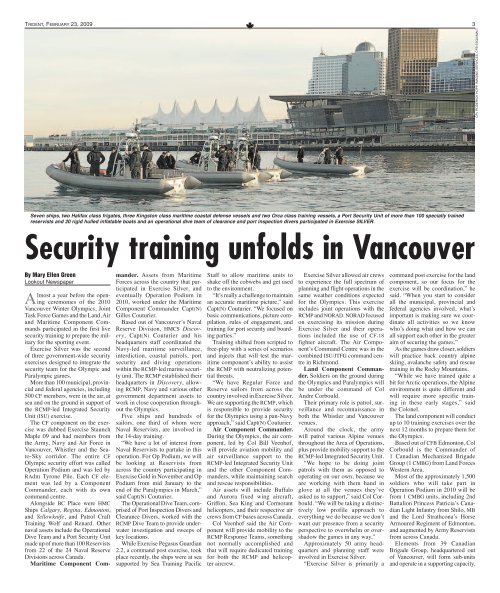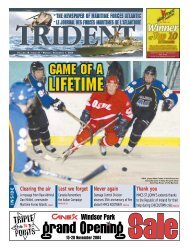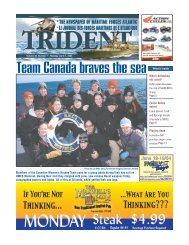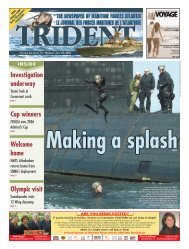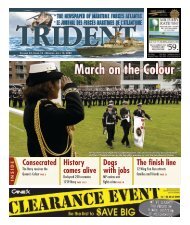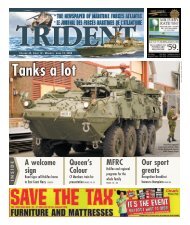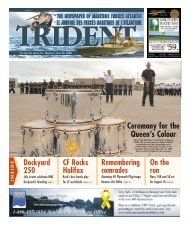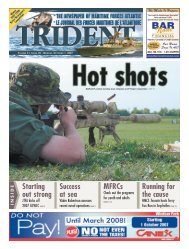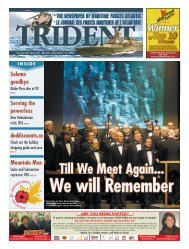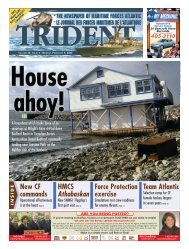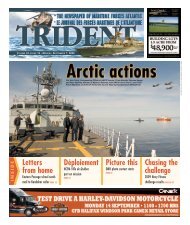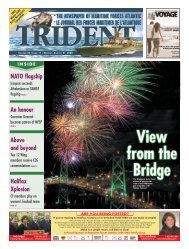February 23, 2009 - Tridentnews.ca
February 23, 2009 - Tridentnews.ca
February 23, 2009 - Tridentnews.ca
- No tags were found...
You also want an ePaper? Increase the reach of your titles
YUMPU automatically turns print PDFs into web optimized ePapers that Google loves.
TRIDENT, FEBRUARY <strong>23</strong>, <strong>2009</strong> 3<br />
CPL RODERICK HOPP, IMAGING SERVICES, CFB ESQUIMALT<br />
Seven ships, two Halifax class frigates, three Kingston class maritime coastal defense vessels and two Or<strong>ca</strong> class training vessels, a Port Security Unit of more than 100 specially trained<br />
reservists and 20 rigid hulled inflatable boats and an operational dive team of clearance and port inspection divers participated in Exercise SILVER.<br />
Security training unfolds in Vancouver<br />
By Mary Ellen Green<br />
Lookout Newspaper<br />
Almost a year before the opening<br />
ceremonies of the 2010<br />
Vancouver Winter Olympics, Joint<br />
Task Force Games and the Land, Air<br />
and Maritime Component Commands<br />
participated in the first live<br />
security training to prepare the military<br />
for the sporting event.<br />
Exercise Silver was the second<br />
of three government-wide security<br />
exercises designed to integrate the<br />
security team for the Olympic and<br />
Paralympic games.<br />
More than 100 municipal, provincial<br />
and federal agencies, including<br />
500 CF members, were in the air, at<br />
sea and on the ground in support of<br />
the RCMP-led Integrated Security<br />
Unit (ISU) exercise.<br />
The CF component on the exercise<br />
was dubbed Exercise Staunch<br />
Maple 09 and had members from<br />
the Army, Navy and Air Force in<br />
Vancouver, Whistler and the Seato-Sky<br />
corridor. The entire CF<br />
Olympic security effort was <strong>ca</strong>lled<br />
Operation Podium and was led by<br />
RAdm Tyrone Pile. Each CF element<br />
was led by a Component<br />
Commander, each with its own<br />
command centre.<br />
Alongside BC Place were HMC<br />
Ships Calgary, Regina, Edmonton,<br />
and Yellowknife, and Patrol Craft<br />
Training Wolf and Renard. Other<br />
naval assets include the Operational<br />
Dive Team and a Port Security Unit<br />
made up of more than 100 Reservists<br />
from 22 of the 24 Naval Reserve<br />
Divisions across Canada.<br />
Maritime Component Commander.<br />
Assets from Maritime<br />
Forces across the country that participated<br />
in Exercise Silver, and<br />
eventually Operation Podium in<br />
2010, worked under the Maritime<br />
Component Commander Capt(N)<br />
Gilles Couturier.<br />
Based out of Vancouver’s Naval<br />
Reserve Division, HMCS Discovery,<br />
Capt(N) Couturier and his<br />
headquarters staff coordinated the<br />
Navy-led maritime surveillance,<br />
interdiction, coastal patrols, port<br />
security and diving operations<br />
within the RCMP-led marine security<br />
unit. The RCMP established their<br />
headquarters in Discovery, allowing<br />
RCMP, Navy and various other<br />
government department assets to<br />
work in close cooperation throughout<br />
the Olympics.<br />
Five ships and hundreds of<br />
sailors, one third of whom were<br />
Naval Reservists, are involved in<br />
the 14-day training.<br />
“We have a lot of interest from<br />
Naval Reservists to partake in this<br />
operation. For Op Podium, we will<br />
be looking at Reservists from<br />
across the country participating in<br />
Exercise Gold in November and Op<br />
Podium from mid January to the<br />
end of the Paralympics in March,”<br />
said Capt(N) Couturier.<br />
The Operational Dive Team, comprised<br />
of Port Inspection Divers and<br />
Clearance Divers, worked with the<br />
RCMP Dive Team to provide underwater<br />
investigation and sweeps of<br />
key lo<strong>ca</strong>tions.<br />
While Exercise Pegasus Guardian<br />
2.2, a command post exercise, took<br />
place recently, the ships were at sea<br />
supported by Sea Training Pacific<br />
Staff to allow maritime units to<br />
shake off the cobwebs and get used<br />
to the environment.<br />
“It’s really a challenge to maintain<br />
an accurate maritime picture,” said<br />
Capt(N) Couturier. “We focused on<br />
basic communi<strong>ca</strong>tions, picture compilation,<br />
rules of engagement, and<br />
training for port security and boarding<br />
parties.”<br />
Training shifted from scripted to<br />
free-play with a series of scenarios<br />
and injects that will test the maritime<br />
component’s ability to assist<br />
the RCMP with neutralizing potential<br />
threats.<br />
“We have Regular Force and<br />
Reserve sailors from across the<br />
country involved in Exercise Silver.<br />
We are supporting the RCMP, which<br />
is responsible to provide security<br />
for the Olympics using a pan-Navy<br />
approach,” said Capt(N) Couturier.<br />
Air Component Commander.<br />
During the Olympics, the air component,<br />
led by Col Bill Veenhof,<br />
will provide aviation mobility and<br />
air surveillance support to the<br />
RCMP-led Integrated Security Unit<br />
and the other Component Commanders,<br />
while maintaining search<br />
and rescue responsibilities.<br />
Air assets will include Buffalo<br />
and Aurora fixed wing aircraft,<br />
Griffon, Sea King and Cormorant<br />
helicopters, and their respective air<br />
crews from CF bases across Canada.<br />
Col Veenhof said the Air Component<br />
will provide mobility to the<br />
RCMP Response Teams, something<br />
not normally accomplished and<br />
that will require dedi<strong>ca</strong>ted training<br />
for both the RCMP and helicopter<br />
aircrew.<br />
Exercise Silver allowed air crews<br />
to experience the full spectrum of<br />
planning and flight operations in the<br />
same weather conditions expected<br />
for the Olympics. This exercise<br />
includes joint operations with the<br />
RCMP and NORAD. NORAD focused<br />
on exercising its mission during<br />
Exercise Silver and their operations<br />
included the use of CF-18<br />
fighter aircraft. The Air Component’s<br />
Command Centre was in the<br />
combined ISU/JTFG command centre<br />
in Richmond.<br />
Land Component Commander.<br />
Soldiers on the ground during<br />
the Olympics and Paralympics will<br />
be under the command of Col<br />
Andre Corbould.<br />
Their primary role is patrol, surveillance<br />
and reconnaissance in<br />
both the Whistler and Vancouver<br />
venues.<br />
Around the clock, the army<br />
will patrol various Alpine venues<br />
throughout the Area of Operations,<br />
plus provide mobility support to the<br />
RCMP-led Integrated Security Unit.<br />
“We hope to be doing joint<br />
patrols with them as opposed to<br />
operating on our own, be<strong>ca</strong>use we<br />
are working with them hand in<br />
glove at all the venues they’ve<br />
asked us to support,” said Col Corbould.<br />
“We will be taking a distinctively<br />
low profile approach to<br />
everything we do be<strong>ca</strong>use we don’t<br />
want our presence from a security<br />
perspective to overwhelm or overshadow<br />
the games in any way.”<br />
Approximately 50 army headquarters<br />
and planning staff were<br />
involved in Exercise Silver.<br />
“Exercise Silver is primarily a<br />
command post exercise for the land<br />
component, so our focus for the<br />
exercise will be coordination,” he<br />
said. “When you start to consider<br />
all the municipal, provincial and<br />
federal agencies involved, what’s<br />
important is making sure we coordinate<br />
all activities so we know<br />
who’s doing what and how we <strong>ca</strong>n<br />
all support each other in the greater<br />
aim of securing the games.”<br />
As the games draw closer, soldiers<br />
will practice back country alpine<br />
skiing, avalanche safety and rescue<br />
training in the Rocky Mountains.<br />
“While we have trained quite a<br />
bit for Arctic operations, the Alpine<br />
environment is quite different and<br />
will require more specific training<br />
in these early stages,” said<br />
the Colonel.<br />
The land component will conduct<br />
up to 10 training exercises over the<br />
next 12 months to prepare them for<br />
the Olympics.<br />
Based out of CFB Edmonton, Col<br />
Corbould is the Commander of<br />
1 Canadian Mechanized Brigade<br />
Group (1 CMBG) from Land Forces<br />
Western Area.<br />
Most of the approximately 1,500<br />
soldiers who will take part in<br />
Operation Podium in 2010 will be<br />
from 1 CMBG units, including 2nd<br />
Battalion Princess Patricia’s Canadian<br />
Light Infantry from Shilo, MB<br />
and the Lord Strathcona’s Horse<br />
Armoured Regiment of Edmonton,<br />
and augmented by Army Reservists<br />
from across Canada.<br />
Elements from 39 Canadian<br />
Brigade Group, headquartered out<br />
of Vancouver, will form sub-units<br />
and operate in a supporting <strong>ca</strong>pacity.


